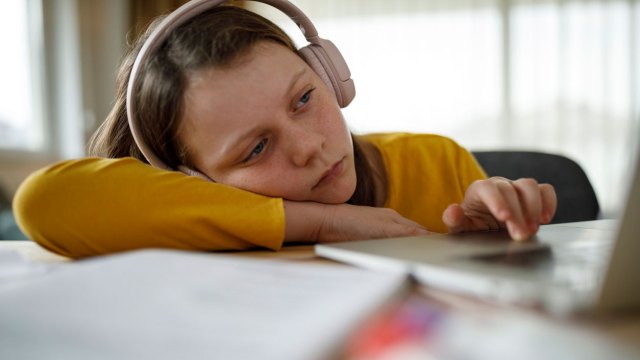We all know the consequences of our kids not getting enough sleep (hello, Grumpville), but according to the Centers for Disease Control, not getting enough sleep is associated with an increased risk for a number of chronic diseases and conditions, including diabetes, cardiovascular disease, stroke, obesity, depression and more. Which is why the findings from a study by Penn State College of Medicine are so important: Kids who suffer from insomnia are more likely to develop an insomnia disorder as adults. Their symptoms don’t only persist, but oftentimes, they worsen.
Researchers conducted a longitudinal study (which means it took place over an extended amount of time with the same participants) of 502 kids aged 5-12. The study began in 2000 and involved check-ins 7 years and 15 years later. The key takeaway was that insomnia symptoms aren’t as likely to go away over time as we thought.
While this particular study didn’t address outcomes of poor sleep hygiene in children, multiple previous studies conclude that not getting sufficient sleep in early childhood can be tied to problems with attention, working memory, reasoning, problem-solving, and behavioral problems in older children. The findings from Penn State suggest a continuation of sleep problems into adulthood, which could lead to some serious adult-sized problems.
“Although adults’ sleep issues tend to be triggered by their most recent life stressors, for some people, their insomnia may track back to sleep problems starting in childhood,” said Julio Fernandez-Mendoza, associate professor of psychiatry and behavioral health and one of the authors of the study. His team found that nearly half of the kids who initially presented with insomnia symptoms in the study continued with those symptoms into adulthood. About a quarter of them seemed to experience remission of their symptoms in adolescents, and roughly 15% of them experienced symptoms off and on throughout their developmental years into adulthood.
So what’s a parent to do? Beat yourself up over the bedtime routine you established at age 2-weeks-old that’s messed up your kids’ sleep habits? No (but we know you’re doing it anyway). Instead, consider an early intervention of cognitive behavioral therapy, regarded as first-line therapy for sleep disorders in adults and proven effective for the younger set, especially adolescents. It addresses bad sleep habits, such as “using electronics or watching TV in bed, worrying in bed, sleeping in on weekends, [or] napping during the day, among many others,” Fernandez-Mendoza said.
One thing Fernandez-Mendoza cautioned against? Sleep medications as a go-to. “Melatonin should only be used in very specific cases, despite its widespread and incorrect use,” he said.
RELATED STORIES
Tips for Starting (& Keeping) a Successful Bedtime Routine
Why Earlier Bedtimes Lead to Healthier and Possibly Smarter Children
Earlier Bedtimes for Kids is Better for Your Sanity, According to Study
